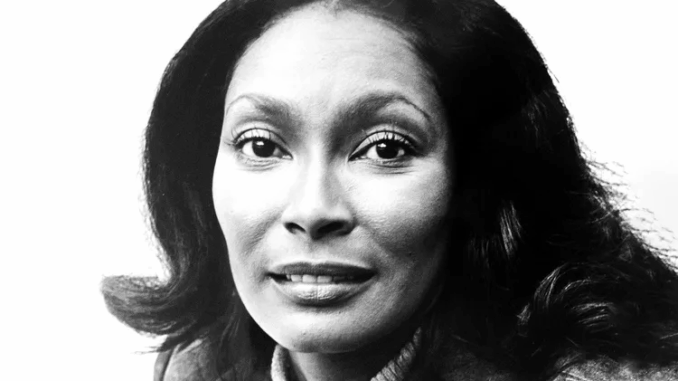
The world of classic television has dimmed with the passing of Lynn Hamilton, a brilliant and versatile actress whose presence added depth and dignity to some of the most beloved programs of the 1970s. Hamilton, best known for her iconic roles as the sensible Donna Harris on the groundbreaking sitcom Sanford and Son and the resilient schoolteacher Verdie Grant Foster on the heartwarming drama The Waltons, died on June 19, 2025, at the age of 95.
Hamilton’s career, which spanned over five decades, was a quiet masterclass in acting. She embodied a graceful force that allowed her to glide seamlessly between the broad comedy of a junk-filled Los Angeles junkyard and the earnest drama of Depression-era Virginia. Her dual legacy is a testament to her talent, demonstrating a rare ability to anchor two vastly different, yet equally cherished, television universes.
The Steady Rock of Watts: Donna Harris in Sanford and Son
For millions of viewers, Lynn Hamilton will forever be Donna Harris, the sweet, steady, and sometimes exasperated girlfriend—and later fiancée—of the cantankerous patriarch, Fred G. Sanford (played by the late Redd Foxx).
Introduced in the second season of the classic NBC sitcom, Donna was a registered nurse who provided an essential emotional counterbalance to the volatile comedy of the show. While the series was built on the rapid-fire insults between Fred and his sister-in-law, Aunt Esther (LaWanda Page), Donna was the island of maturity in the storm.
The Significance of Donna Harris
Donna Harris’s character was profoundly significant for several reasons:
- A Mature Romance: She represented a mature, consistent love interest for Fred. Her appearances were often less about generating laughs and more about illustrating Fred’s capacity for tenderness and commitment, qualities he usually kept hidden behind his bluster. Donna didn’t just tolerate Fred’s antics; she often saw through them with a calm, discerning gaze, making her a formidable partner.
- The Voice of Reason: In a show characterized by manic energy and outrageous schemes, Donna was the grounded reality check. She was educated, professionally successful, and independent, providing a crucial contrast to the junkyard setting and the male leads’ often questionable life choices.
- A Consistent Presence: Appearing in 22 episodes from 1972 to 1977, Hamilton’s recurring role allowed her to become an indispensable member of the supporting cast, giving the show’s world depth and relatability. Her grace in handling Fred’s eccentricities became a key comedic mechanism.
In many ways, Donna Harris was a portrayal of the strong, working-class Black woman who served as the backbone of her community, a nuanced depiction that resonated deeply with audiences and provided a refreshing alternative to some of the show’s more exaggerated characters.
The Dignified Educator: Verdie Grant Foster in The Waltons
In a remarkable display of range, while battling the IRS and Aunt Esther in Los Angeles, Lynn Hamilton was simultaneously embodying another vital character on a very different show: Verdie Grant Foster on CBS’s beloved family drama, The Waltons.
Set in rural Virginia during the Great Depression, The Waltons offered a gentle, nostalgic look at family life. Hamilton’s character, Verdie Grant, was the mother of a family of Black tenant farmers and a tireless advocate for education and dignity.
Bridging Two Worlds
Hamilton’s recurring role in 17 episodes of The Waltons was crucial for integrating the African-American experience into the show’s predominantly white narrative. Her presence allowed the show to touch upon themes of racial equality, poverty, and community cooperation in a powerful, yet family-friendly, way.
Verdie was a figure of quiet strength and perseverance. She valued learning and worked tirelessly to ensure her children, especially her son Josh, received the education she felt was their right. Her interactions with the Walton family, particularly with John-Boy and Olivia Walton, were always marked by mutual respect and a shared sense of community values.
The mere fact that Lynn Hamilton could inhabit two such distinct roles at the exact same time—the urban, contemporary nurse and the rural, Depression-era educator—is perhaps the greatest testament to her skill. She managed to ensure that each character, regardless of genre, was fully realized, radiating intelligence and heartfelt sincerity.
A Career Dedicated to the Craft
Born Alzenia Lynn Hamilton on April 25, 1930, in Yazoo City, Mississippi, she moved to Chicago Heights as a child, where she began her lifelong commitment to acting. She trained at the prestigious Goodman Theatre in Chicago, graduating as the only Black actor in her class—a reflection of the limited opportunities available to her early on.
Hamilton’s career began in the theater and her transition to film and television in the 1960s was gradual but steady. Her film credits included the pioneering indie film Shadows (1959) and blaxploitation classics like Lady Sings the Blues (1972) and Buck and the Preacher (1972). Later, she earned acclaim for her role as Cousin Georgia Anderson in the landmark 1979 miniseries Roots: The Next Generations.
In later television work, she continued to be a welcome, familiar face, with recurring roles on series like 227 and the daytime drama Generations, right up through the early 2000s.
Hamilton’s longevity was not due to splashy celebrity but to dedication to the craft. She approached every role, no matter how brief, with a quiet commitment to truthfulness. Her roles were often understated, but her presence was always undeniable.
Lynn Hamilton passed away peacefully in her Chicago home, surrounded by loved ones. Her passing marks the end of an era for the classic television landscape. Her legacy is one of the graceful, dignified force that helped to bridge cultural divides on screen. She was the steady hand and the caring heart in a pair of television classics, an actress who deserves to be remembered not just for the shows she was in, but for the indelible, humane characters she brought to life.